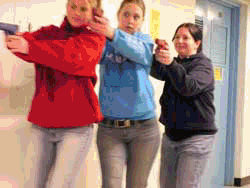Simulation Training with Assessment Centers
Recently many criminology and criminal justice students enjoyed and learned from successful simulation training with an assessment center on the Southern Oregon University campus. This Mock Assessment Center (hereafter referred to as MAC) was sponsored by the SOU Criminology Club under the Criminology Club advisor and facilitated by Ron Norris, Retired Deputy Chief of Medford, Oregon, Police Department. An assessment center was simulated in order to prepare students for this new and dynamic hiring process and to provide students with work insight as to what assessors in criminal justice agencies are looking for in new hires. Prior to the MAC the Criminology Club sponsored two resume writing workshops designed to help students create or modify their resumes for maximum effectiveness. Students submitted their resumes for review prior to the MAC and brought copies of their resumes to the MAC.
Many law enforcement and other criminal justice agencies are moving away from traditional interviews to assessment centers as part of the hiring process and promotion process. Assessment centers give criminal justice agencies the ability to witness firsthand desirable and undesirable characteristics among their candidate pool. Characteristics and skills such as effective communication skills, interpersonal skills, leadership, teamwork skills, motivation and others are elicited by various group and individual assessments. Assessment centers typically take place over several days as a small pool of candidates is evaluated by multiple assessors. Our simulation training was reduced to a one day event, but multiple assessors participated.
The MAC was administered by the seven following volunteer assessors: Officer Kim Budreau, Training Officer for Medford, Oregon, Police Department; Chief David Douglas, Eureka, California, Police Department; Kim Gibson, Retired Reno, Nevada, Police Department, previous Chief of Shady Cove, DPSST (Oregon Department of Public Safety Standards and Training) Training Coordinator; Ron Norris, Retired Deputy Chief of Medford, Oregon, Police Department; Dr. Marny Rivera, Assistant Professor SOU; Ray Shipley, Retired Chief of Medford, Oregon, Police Department; Sgt. Randy Sparacino, Internal Affairs and Recruiting for Medford, Oregon, Police Department.
The MAC began with a student orientation. Students were informed about the process of assessment centers generally as well as the schedule and events for the MAC. The MAC involved simulation training in the form of an oral resume presentation, a panel presentation and a group exercise. Debriefings followed each of the individual events and the MAC closed with a large group discussion between the students and the assessors. The volunteer assessors were very impressed with the performance of our students and were honored to be invited to participate as assessors. This simulation training with an assessment center will become an annual event. When asked to evaluate the MAC students provided the following comments.
What students liked about the MockAssessmentCenter:
The use of real assessment questions and authority figures.
The real-life scenarios gave great insights.
The stress- the closer to real, the better.
I love feedback- our assessors gave great, useful and well-delivered feedback.
I liked how understanding and explanatory the assessors were, it helped us to understand the process better.
I liked being able to participate and observe, not just one or the other, so you can experience it and see how it works.
Variety of available experiences to get critiqued on and improve yourself upon.
What students learned from the MockAssessmentCenter:
I need to speak up/confidence.
Some knowledge as to what PD's are looking for and what to improve on.
I have a lot of work to do in preparation for the real thing.
Integrity is #1
I gained a better knowledge of what is expected of me in terms of speaking and presentation.
I learned that we are judged on many dimensions and failing in one area doesn't mean overall failure.
I also learned what ways to speak, act, dress, etc, when being interviewed.
Organization is key.
Always be prepared and read up.
I learned to slow down when I'm doing my oral resume.
I learned that I still have steps to go to fulfill my dream.
I need to be more bold and outspoken.
Author: Dr. Marny Rivera
Copyright 2005 Southern OregonUniversity





